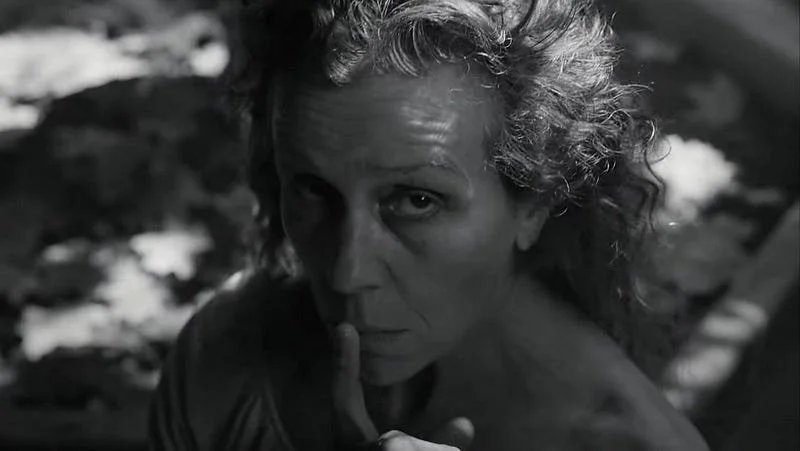The Tragedy of Macbeth
An exercise of remarkable vision.
“I have no words, my voice is in my sword” // photo from indiewire
by Phoenix McAuley
Strung-out in a dreamlike limbo untethered from traditional narrative conventions, the sequences in Joel Coen’s The Tragedy of Macbeth play out in a visually arresting and often frightening series of ethereal transgressions.
The progressive theater-cinema hybrid style impresses in its technique, yet remains elusive in its purpose.
Macbeth is the shortest of Shakespeare’s plays. The narrative unfolds at lightning pace. Coen and his cast and crew are up for the task, stripping the play down to its narrative and visual skeleton.
It is also worth noting that this is Coen’s first outing as a director without the help of his brother, Ethan Coen.
Coen elects to shoot his first major theater outing in a restrained style, leaving room for his colleagues to flex their muscles.
Coen’s usual Director of Photography, Bruno Delbonnel uses a style reminiscent of German expressionism. The tight black and white aspect ratio gives Delbonnel, Coen and the set designers a wonderful playground in which to design a wholly original universe to set the narrative in.
The wonderful mix of shadows, sharp angles, fog, stars, clouds and that ever constant knocking that dwells within the mind of Macbeth all make for a deeply sinister tone that permeates nearly every moment.
The piece is pure cinema and theater. Everything is created on a soundstage with pure craftsmanship and technique.
“In addition to brilliant casting with Denzel Washington and Francis McDormand, the visual world Coen created left lasting impressions,” raved Rich Brown after the Pickford showing. “Specifically with the light and shadow play, high vertical columns, and long horizontal staircases. These cinematic images will last in our memories for years”
Denzel Washington began his career playing Othello on the stage in college at 19, and continued to perform in several Shakespeare adaptations on both stage and screen.
His casting echoes a bookend for one of our greatest actors. An opportunity for a master artist to reflect on their career and see what they’ve learned. I waited in anticipation to see what nuances Denzel would bring to the character and story.
This Macbeth is understated, smoldering coals of a once warm and loving fire still burning under his grizzled expression. The wrinkles in his face perfectly capture a man realizing that he is at the end of his story. Each expression of his face evokes an emotional truth.
A man who perhaps was unjustly kept an arm’s reach away from the life he deserved. His madness, an act of vengeance on a world that robbed him of a son and kept him from royal grace.
This couple could not bear a child, so they shall bear chaos for creation’s sake. They are more aware of their ambition than Macbeth’s of yore, consciously taking a swan dive into the abyss.
Washington is at his best in the first two acts, giving a performance that I was seriously considering to be among the best in any Shakespeare film. The transition to a tyrant in the third act was a mixed bag for me.
No madness was conveyed through his eyes that felt emotionally connected to the previous two acts. Washington chooses to take a humorous approach to this aspect of the character, often playing up Macbeth in a way that made me wonder if I was supposed to be laughing.
As a whole his performance almost lives in isolation from the rest of the film. It’s an understated performance. A good performance but one that vibes unevenly with the other actors, which was perhaps the purpose.
Francis McDormand is a revelation, delivering her lines with great ease and venom.
Her interpretation of the Out Damn Spot soliloquy felt incredibly germane to the realistic tone of the piece. Less a soliloquy and more of a descent into a schizophrenic episode filmed in real time.
Even with the raw talent of both these leads, the style of their performances are based on contemporary attitudes in foil to the traditional approaches of the other actors. No matter how much technique they put into their craft, their vibe will always seem somewhat out of step with everyone else’s.
The supporting cast does wonders to fill in the gaps of this story about a marriage gone mad. Moses Ingram as Lady Macduff was a particular standout.
Each actor takes the time to relish their lines, flexing their craft in a remarkable way.
It’s the mixing of young and old talent that I can say is the biggest draw to this film other than the production.
Giving a diverse cast the opportunity to relish these classic roles breaks apart the idea that Shakespeare can only be done in a purist ethnocentric setting.
Orson Welles’ Harlem Voodoo Macbeth production comes to mind.
Shakespeare’s universality begs us to interact with his plays. Not to do them as they were, but reimagine them as we reimagine ourselves.
This is why I believe that The Tragedy of Macbeth is a remarkable piece of progressive filmmaking. While it may not reinvent the wheel, it certainly pushes the trajectory of that wheel.
8.5 out of 10



